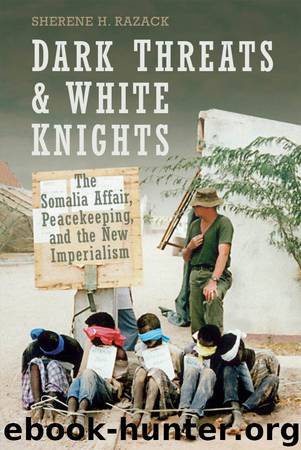Dark Threats and White Knights: The Somalia Affair, Peacekeeping, and the New Imperialism by Razack Sherene

Author:Razack, Sherene [Razack, Sherene]
Language: eng
Format: epub
Publisher: University of Toronto Press, Scholarly Publishing Division
Published: 2004-05-06T04:00:00+00:00
It is my submission, gentlemen, that there is ample evidence before this court that there was a general understanding amongst the troops that it was OK to rough up the prisoners a little bit for a deterrent purpose … And I say that for this reason, that the troops were in a lawless country. There was no civil institutions, there was no civil authority. There was nothing that could be done to those looters who were captured. They could not be turned over to anybody who could effectively deal with them such as happens in most civilized countries. They could not call the police and have them arrested and expect that he [sic] would be taken to court and dealt with according to the law. At the same time the soldiers were very vulnerable. They’re out in the field. They had no locks. They had valuable kit and they are obviously particularly concerned about the security of their weapons.131
The idea of vulnerable innocent soldiers frustrated and forced to go beyond the limit of lawful and civilized behaviour, which would become a central line of argument for the Inquiry, relies intrinsically on a colonial logic: the natives can only be kept in line through force. Indeed, it is the natives who are said to drive the colonizers to violence. Deployed in tandem with the idea that Matchee was the real culprit, it served to normalize Private Brown’s actions, as it did Private Brocklebank’s. While the strategy worked for Brocklebank, however, it did not work for Brown who received a sentence of five years in prison and dismissal from the Armed Forces. We can only speculate on the reasons for this outcome. For the journalist Peter Worthington, who wrote an account of Brown’s role in collaboration with Brown himself, the army ‘betrayed Kyle Brown’ in making him take the rap for something Matchee did.132 Others reason that the Somalis simply had to be kept in line through violence, and to discipline Somalis through engaging in acts of humiliation and violence was only patriotic duty. Ironically, it is in sharing this belief that Brown’s complicity is most clearly evident. Unexceptional to the end, Brown was simply as complicit as everyone else, and therefore responsible for his own acts of violence and for acquiesing to the violence.
Download
This site does not store any files on its server. We only index and link to content provided by other sites. Please contact the content providers to delete copyright contents if any and email us, we'll remove relevant links or contents immediately.
| Anthropology | Archaeology |
| Philosophy | Politics & Government |
| Social Sciences | Sociology |
| Women's Studies |
The Secret History by Donna Tartt(19058)
The Social Justice Warrior Handbook by Lisa De Pasquale(12187)
Thirteen Reasons Why by Jay Asher(8894)
This Is How You Lose Her by Junot Diaz(6877)
Weapons of Math Destruction by Cathy O'Neil(6267)
Zero to One by Peter Thiel(5789)
Beartown by Fredrik Backman(5737)
The Myth of the Strong Leader by Archie Brown(5500)
The Fire Next Time by James Baldwin(5432)
How Democracies Die by Steven Levitsky & Daniel Ziblatt(5216)
Promise Me, Dad by Joe Biden(5144)
Stone's Rules by Roger Stone(5081)
A Higher Loyalty: Truth, Lies, and Leadership by James Comey(4954)
100 Deadly Skills by Clint Emerson(4921)
Rise and Kill First by Ronen Bergman(4780)
Secrecy World by Jake Bernstein(4742)
The David Icke Guide to the Global Conspiracy (and how to end it) by David Icke(4709)
The Farm by Tom Rob Smith(4502)
The Doomsday Machine by Daniel Ellsberg(4485)
